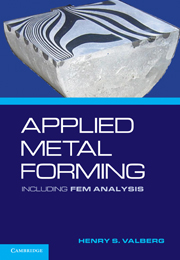Book contents
- Frontmatter
- Contents
- Preface
- APPLIED METAL FORMING
- 1 Characteristics of Metal Forming
- 2 Important Metal Forming Processes
- 3 FEA of Metal Forming
- 4 Theory
- 5 Reduction and Proportions of the Plastic Zone
- 6 Deformations from the Velocity Field
- 7 Technological Tests and Physical Simulation
- 8 Flow Stress Data
- 9 Formability and Workability
- 10 Friction and Friction Models
- 11 Thermal Effects
- 12 Experimental Metal Flow Analysis
- 13 Theoretical Methods of Analysis
- 14 Finite Element Analysis
- 15 FEA of Technological Tests
- 16 Forging
- 17 FEA of Forging
- 18 Extrusion
- 19 FEA of Extrusion
- 20 Rolling
- 21 FEA of Rolling
- 22 Drawing of Wire, Profiles, and Tubes
- 23 FEA of Wiredrawing
- 24 Sheet-Metal Forming
- Index
- References
7 - Technological Tests and Physical Simulation
Published online by Cambridge University Press: 05 June 2012
- Frontmatter
- Contents
- Preface
- APPLIED METAL FORMING
- 1 Characteristics of Metal Forming
- 2 Important Metal Forming Processes
- 3 FEA of Metal Forming
- 4 Theory
- 5 Reduction and Proportions of the Plastic Zone
- 6 Deformations from the Velocity Field
- 7 Technological Tests and Physical Simulation
- 8 Flow Stress Data
- 9 Formability and Workability
- 10 Friction and Friction Models
- 11 Thermal Effects
- 12 Experimental Metal Flow Analysis
- 13 Theoretical Methods of Analysis
- 14 Finite Element Analysis
- 15 FEA of Technological Tests
- 16 Forging
- 17 FEA of Forging
- 18 Extrusion
- 19 FEA of Extrusion
- 20 Rolling
- 21 FEA of Rolling
- 22 Drawing of Wire, Profiles, and Tubes
- 23 FEA of Wiredrawing
- 24 Sheet-Metal Forming
- Index
- References
Summary
In order to model metal forming processes either by theoretical models or by FEM modeling, as already shown in Ch. 3, it is required, for instance, to know the flow stress of the metal that is formed, and the actual friction between the die and the workpiece. To obtain such data, a number of different test methods have been developed over the years, by which it is possible to bring a specimen of the actual material, usually of small size, into a plastic state, and during plastic deformation of it measure the required deformation force, concurrently as the size of deformations subjected to the specimen is measured. Tests of this kind are called technological tests and are commonly run on small specimens of the material, often in advanced equipment especially designed for the purpose. In this chapter, the most common technological tests for measurement of flow stress and ductility of metallic materials are discussed. The main focus will be on the tensile test and the compression test. The basic mechanics of these technological tests, and how to determine stresses and strains during the tests, will be reviewed.
Physical Simulation of Metal Forming
Some industrial metal forming processes – as for instance rolling, extrusion, and forging – are commonly run in large industrial equipment, where the possibilities of experimentation is limited. Most commonly the machinery lacks sensors to allow accurate recording of relevant process parameters. Moreover, running of full-scale experiments in big industrial equipment is expensive.
Information
- Type
- Chapter
- Information
- Applied Metal FormingIncluding FEM Analysis, pp. 92 - 114Publisher: Cambridge University PressPrint publication year: 2010
